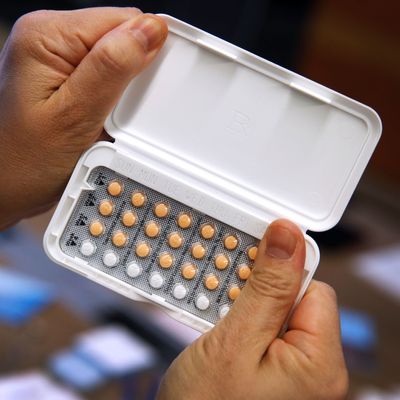
The Food and Drug Administration has received an application to provide a birth-control pill over the counter, the New York Times reported on Monday. The news comes less than a month after the Supreme Court overturned Roe v. Wade, and while the French company that manufactures the pill says the timing is coincidental, it nonetheless arrives at a crucial moment for Americans who can become pregnant. The company, HRA Pharma, told the Times it expects a decision from the FDA within the next ten months. Another company, Cadence Health, is in the pre-application process and says that “it hopes to move closer to submitting an application in the coming year,” according to the Times.
Should the FDA approve HRA Pharma’s application to take its progestin-only birth-control pill, called Opill, over the counter, the agency would shore up contraception access during a time of considerable uncertainty. Doing so would remove significant barriers to family-planning services that primarily affect low-income women — and would likely incite the ire of anti-abortion activists. Though the Supreme Court’s majority opinion in Dobbs did not pertain directly to contraception, there is some evidence that the anti-abortion movement perceives birth control to be the next front in the battle to control women’s sexual lives and reproduction.
“As we are seeing the outfall and the chaos of the Supreme Court decision, more families are looking to, ‘Well, how can I make sure I control my own choices in life?’” Senator Patty Murray, a Democrat who is the lead sponsor of a bill that would require insurance companies to cover the cost of over-the-counter contraceptive pills, told the Times. “We want to make sure that women not only get access, but those who have trouble affording it get access as well.” That access, however, depends partly on the actions of pharmaceutical companies themselves. “Because the Affordable Care Act requires insurers to cover the expense of prescription contraceptives, people who have insurance and are already taking Opill may be loath to switch,” the Times reported. A spokesperson for HRA Pharma promised the company would make Opill “very affordable for consumers,” though it’s unclear what that would mean in practice.
Nevertheless, an over-the-counter pill would undeniably mark a step forward for anyone who can become pregnant. And that’s guaranteed to set off the right wing, which appears likely to oppose efforts to make the birth-control pill more available. “Birth control is not a human right,” Kristan Hawkins, the president of Students for Life, tweeted in 2020.
In a concurrence to Dobbs, Justice Clarence Thomas urged the court to reconsider previous rulings including Obergefell v. Hodges, which legalized same-sex marriage, and Griswold v. Connecticut, which found that married couples had a right to contraception, like the birth-control pill. Blake Masters, a Trump-endorsed Republican candidate for Senate in Arizona, has indicated that he, too, believes Griswold was wrongly decided, and anti-abortion activists have claimed, falsely, that some forms of contraception, namely emergency contraception and the IUD, are abortifacient in nature. “The states that are trying to limit abortion from the moment of conception — not even from the moment of pregnancy, as the medical profession would define it — could well try to challenge Plan B, emergency contraception, potentially even IUDs,” Wendy Parmet, the director of the Center for Health Policy and Law at Northeastern University, told NBC News in June.
Age restrictions could also become a wedge issue for the right wing, as the Times observed in Monday’s report. In comments to the newspaper, Kelly Blanchard, the president of Ibis Reproductive Health, urged the FDA to approve Opill without an age restriction, making it available to teenagers looking for a safe contraceptive option. That’s a sensitive topic for many, including some Democrats. Then–Health and Human Services Secretary Kathleen Sebelius overturned a 2011 FDA decision to approve the over-the-counter sale of Plan B to teenagers ages 16 and younger after President Obama cited “reservations,” as the Times reported. “I agree with Obama; it’s common sense not to recklessly sell these pills,” a spokesperson for Students for Life told the newspaper about the potential sale of Opill to teens. “As a father of two daughters, he understood that taking adults out of the equation is a problem.”
It’s easy for the anti-abortion movement to target teens; the right wing, in general, is skilled at weaponizing parental anxiety over the corruption of youth. But the movement won’t content itself with policing teen behavior. It’s opposed to sexual freedom writ large. Plan B and the IUD allow people to decouple sexual activity from pregnancy, which threatens the right’s vision for families. Cloaked in heated rhetoric about murder and even genocide, the battle to end abortion disguised, thinly, the right’s bid to control women themselves. Abortion was thus only ever one prong in a bigger campaign; contraception may become another. Over-the-counter birth-control pills will be good for the people who need them. They’ll also become another front in the right’s bid for total political control.
More on life after roe
- Why Are Republicans Suddenly Sounding So Pro-Choice?
- Trump Boots Anti-Abortion Extremists From His VP Shortlist
- The Best Way to Protect Abortion Rights Is by State Constitution






























